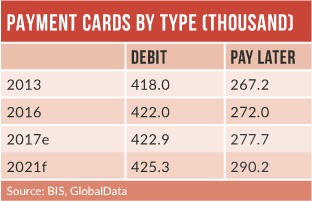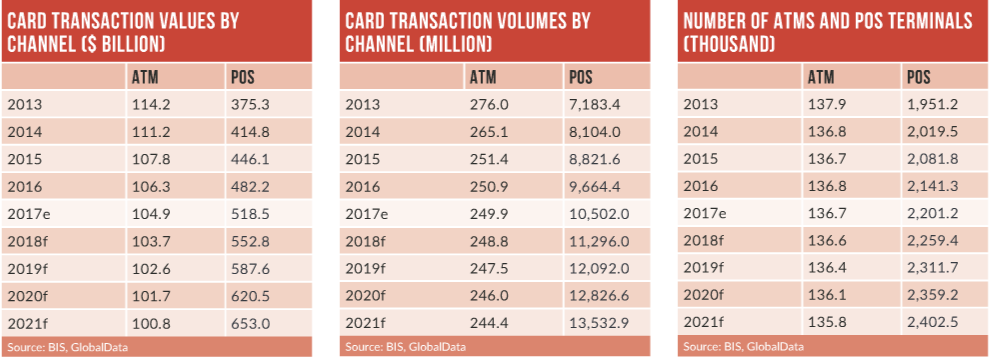Japan’s payment landscape is dominated by cash, which accounted for 78.1% of the overall payment volume in 2017.
However, with government initiatives to promote electronic transactions, the adoption of chip-and-PIN and contactless, as well as payment infrastructure being improved to accept foreign-issued cards, payment cards have gained ground.

Access deeper industry intelligence
Experience unmatched clarity with a single platform that combines unique data, AI, and human expertise.
The 2020 Olympic and Paralympic Games are expected to provide further impetus to the country’s cards and payments industry. All the country’s major banks are making ATMs compatible with foreign-issued cards, and are also installing ATMs at locations with high footfall, such as tourist attractions and supermarkets.
Meanwhile, card issuers and payment service providers are focusing on developing payment infrastructure via the expansion of the acceptance network. New developments in payment card security and convenient solutions include card issuers and technology companies experimenting with advanced technologies such as biometrics.

Debit cards accounted for 0.6% of the total payment card transaction value at the POS in 2017. Use of debit cards is mostly restricted to ATM withdrawals, due at least partly to limited consumer awareness of the ability to use debit cards at the POS. Debit cards are also unpopular with merchants, as the settlement process typically takes three days or longer.

US Tariffs are shifting - will you react or anticipate?
Don’t let policy changes catch you off guard. Stay proactive with real-time data and expert analysis.
By GlobalDataTo counter this, financial institutions are taking steps to encourage debit card use. In February 2015, Sumitomo Mitsui Banking Corporation removed ATM fees and increased the number of 24-hour ATMs. Credit cards are the most popular payment card type in Japan, due to associated reward programmes that are perceived as more beneficial to users than the deals offered with debit and prepaid cards.

Wider merchant acceptance is another important factor. In addition to goods, credit cards are used to make tax payments and donations to rural municipalities, and for medical related expenses. Japan’s e-commerce market grew from JPY11.2trn ($99.1bn) in 2013 to $145.9bn in 2017 at a CAGR of 10.1%.
Major issuers including Rakuten, Sumitomo Mitsui, Mizuho Bank and Resona Bank offer a range of cards for online shoppers. Alternative solutions including Apple Pay, PayPal, Paidy and Masterpass are also used for online purchases. To capitalise on the trend, in August 2015, Rakuten Edy launched its own app store, Rakuten App Ichiba, with 380 apps covering genres such as entertainment, games, education and lifestyle. Customers are offered reward points on purchases.
Japan’s prepaid card market is mature, with penetration at three cards per individual. It is also fiercely competitive, with issuers offering a range of prepaid cards for various purposes.







